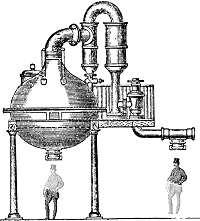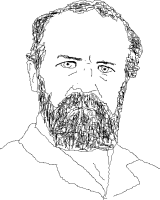 The New Scientist‘s special 50th birthday issue has a number of interesting pieces: Roger Penrose on the nature of reality, Patricia Churchland on free will, and others. It also includes a piece from Nick Bostrom, Director of the Future of Humanity Institute at Oxford, offering an argument to show that it is highly likely that we are all, in fact, living in a computer simulation. I must say this is not among the most convincing arguments I have ever read. It starts with the assumption that in due course we shall have enough computer power and programming skill to create simulations of our ancestors and their world, with the simulated ancestors having full consciousness and phenomenal experience. Just a matter of computer power and programming skill, you see. Now these sim ancestors, being just like their creators, will in due course set up a simulation of their own ancestors: and they in turn will set up another. In time, we shall have an indefinitely long sequence of simulations all nested within each other. At that point we ask ourselves how likely it is that we are living in the first step of this process: ie the unsimulated real world. Because there is only one such world, but an indefinitely large number of simulated ones, it proves to be almost certain that we are in one of the simulations.
The New Scientist‘s special 50th birthday issue has a number of interesting pieces: Roger Penrose on the nature of reality, Patricia Churchland on free will, and others. It also includes a piece from Nick Bostrom, Director of the Future of Humanity Institute at Oxford, offering an argument to show that it is highly likely that we are all, in fact, living in a computer simulation. I must say this is not among the most convincing arguments I have ever read. It starts with the assumption that in due course we shall have enough computer power and programming skill to create simulations of our ancestors and their world, with the simulated ancestors having full consciousness and phenomenal experience. Just a matter of computer power and programming skill, you see. Now these sim ancestors, being just like their creators, will in due course set up a simulation of their own ancestors: and they in turn will set up another. In time, we shall have an indefinitely long sequence of simulations all nested within each other. At that point we ask ourselves how likely it is that we are living in the first step of this process: ie the unsimulated real world. Because there is only one such world, but an indefinitely large number of simulated ones, it proves to be almost certain that we are in one of the simulations.
Even if we accept that consciousness is fully computational (hardly uncontroversial); even if we agree that there are no important differences between reality and a simulation; isn’t there something a little fishy about a simulation that contains a full copy of itself? How much of that computer power are we going to need? Could it be that to run an indefinitely large set of nested simulations, you would need an indefinitely large amount of capacity? I can’t help wondering whether the future of humanity is in the best possible hands here.

Our favourite question, “What is Consciousness?” is addressed by Paul Broks in a kind of futuristic fantasy; our hero is about to have himself uploaded into a new youthful body, though he hasn’t quite got the nerve to follow his daughter in getting the enhancements which would enable him to participate in the communal hive mind which is now available. I can’t say I blame him about that – have you seen the general public? Would you honestly want to share brains with them?
The general drift of the piece is that really the self is more like a bundle of tumbleweed than anything with a fixed core (though to make the analogy precise I think balls of tumbleweed would have to be constantly shedding and picking up new material); as Broks pithily sums it up: I realised I was talking to myself but no-one was listening.

Broks quotes a hoary old thought experiment about scanners (yes, I’m getting to the point at last) – apparently it was originated by Parfit. Imagine, it goes, we have a scanner which can register all your physical details and then reconstitute you somewhere else, with every detail the same. Your life continues, you retain your memories; you barely notice that anything has happened, perhaps. This shows that there is no solid core to your identity: if the physics and the functional systems are moved elsewhere, you just go with them, and nothing is left behind.
It seems like bad manners to question the premises of a thought experiment, but can we take for granted the possibility of these Star Trek style scanners? I think we are entitled to at least an outline of how they might work: unless they are clearly possible in principle the argument doesn’t get off the ground at all; yet I think there are some clear problems.
I think the idea is that the magic ‘fluence of the scanner, when in reconstitution mode, causes the right kinds of stuff to condense out of nothing, already in the right places and with the right qualities. Perhaps I’m resurrecting a medieval prejudice against action at a distance, but I don’t see how any conceivable apparatus could pull that off. There has to be some coherent causal chain which makes the right particles take up the right positions, which seem to imply that something has to intervene at those positions.
Perhaps that’s the wrong way of looking at it: perhaps the scanner actually somehow shoots protons, neutrons and electrons into the right places layer by layer: perhaps it does indeed scan across a cross-section at a time and build the reconstituted person from the feet up. It would need some clever mechanism to take account of the fact that real people aren’t made with a neatly laminated structure, and in fact it is going to have to be unbelievably accurate: given the importance of minute differences in the structure of neurons and the disposition of certain molecules within them, I suspect the tolerable error is actually zero. More awkwardly, it will have to allow for the fact that complex structures often require a particular asembly or construction sequence – this part has to be put in this way before that one goes in that way. If we start by scanning, let’s say, Captain Kirk’s feet into existence, the blood is going to start leaking out before we’ve done his shins, his tendons and muscles will lose their tension, and in general the whole thing will start falling apart in our hands. Perhaps, then, people get treated to the grisly sight of Kirk’s skeleton being constituted first, to hold all the other bits up: but the scanner would have to put in some tendons and connective tissue to hold the bones together: in fact, since we can’t have working muscles until the circulation is going, we might need extra ligatures or whatever which don’t feature in the finished Kirk but get removed before the job is completed. There’s still going to be a problem with that damn blood: we need to put all the vessels in place first and then fill them, which is tricky; and managing the filling and starting of the heart without a major problem will be difficult too.
But that won’t do at all, in any case, because we’re supposed to be reconstituting a dynamic system in full flight. It’s difficult enough to reconstitute a snooker table, but what we have to do is bring the table into existence as it was a moment after someone played a shot, with the balls already in motion in various directions. Kirk’s troublesome blood has to be flowing and all the right neurons have to be in mid-fire. The penalty if we can’t do that (and I don’t think we can) is that we have to reconstitute him in a slightly different, stable starting state, so that when Kirk is reconstituted he is unconscious and has suffered some loss of recent memory: when he comes round he doesn’t remember getting into the scanner or why he wanted to be scanned: in fact, the idea that this is the original Kirk, rather than a good copy, suddenly seems much less plausible.
It may be that getting used to computers has made us more ready to assume that reality is programmable, and hence to accept this kind of thought experiment. But the general idea has deeper roots. Even before consciousness became a fashionable topic, there was a long philosophical history of debating the nature of personal identity. One of the ideas that invariably got thrown out early in such discussions (and no doubt still does) was that our identity was, in the end, a matter of simple physical identity: this body really is me and vice versa. Physical identity is surely not the full story – but I wonder if it has been under-rated.
No more scanner arguments, please – unless they come with drawings and a technical specification.

 There’s a great collection of stuff about William James
There’s a great collection of stuff about William James